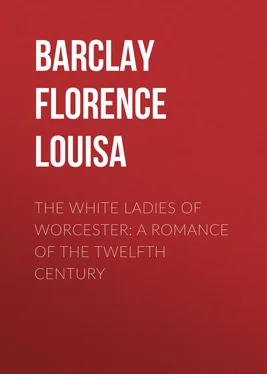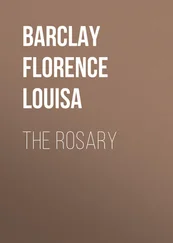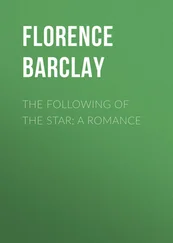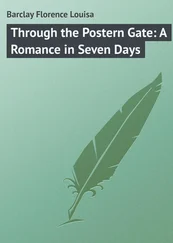Florence Barclay - The White Ladies of Worcester - A Romance of the Twelfth Century
Здесь есть возможность читать онлайн «Florence Barclay - The White Ladies of Worcester - A Romance of the Twelfth Century» — ознакомительный отрывок электронной книги совершенно бесплатно, а после прочтения отрывка купить полную версию. В некоторых случаях можно слушать аудио, скачать через торрент в формате fb2 и присутствует краткое содержание. Жанр: foreign_prose, foreign_antique, на английском языке. Описание произведения, (предисловие) а так же отзывы посетителей доступны на портале библиотеки ЛибКат.
- Название:The White Ladies of Worcester: A Romance of the Twelfth Century
- Автор:
- Жанр:
- Год:неизвестен
- ISBN:нет данных
- Рейтинг книги:3 / 5. Голосов: 1
-
Избранное:Добавить в избранное
- Отзывы:
-
Ваша оценка:
- 60
- 1
- 2
- 3
- 4
- 5
The White Ladies of Worcester: A Romance of the Twelfth Century: краткое содержание, описание и аннотация
Предлагаем к чтению аннотацию, описание, краткое содержание или предисловие (зависит от того, что написал сам автор книги «The White Ladies of Worcester: A Romance of the Twelfth Century»). Если вы не нашли необходимую информацию о книге — напишите в комментариях, мы постараемся отыскать её.
The White Ladies of Worcester: A Romance of the Twelfth Century — читать онлайн ознакомительный отрывок
Ниже представлен текст книги, разбитый по страницам. Система сохранения места последней прочитанной страницы, позволяет с удобством читать онлайн бесплатно книгу «The White Ladies of Worcester: A Romance of the Twelfth Century», без необходимости каждый раз заново искать на чём Вы остановились. Поставьте закладку, и сможете в любой момент перейти на страницу, на которой закончили чтение.
Интервал:
Закладка:
Kneeling in lowly reverence with bowed head, the Knight found himself wondering whether the ascending sounds reached that distant gallery in the clerestory where the White Ladies knelt, as greatly softened, sweetened, and enriched, as they now came stealing down into the crypt. Were the hearts of those veiled worshippers also lifted heavenward; or—being already above the music—did the ascending voices rather tend to draw them down to earth?
Upon which the Knight fell to meditating as to whether that which is higher always uplifts; whereas that which is lower tends to debase. Certainly the upward look betokens hope and joy; while the downward casting of the eye, is sign of sorrow and despondency.
" Levavi oculos meos in montes "—chanted the monks, in the choir above.
He certainly looked high when he lifted the eyes of his insistent desire to the Prioress of the White Ladies. So high did he lift them, and so unattainable was she, that most men would say he might as well ask the silvery moon, sailing across the firmament, to come down and be his bride!
He had held her high, in her maiden loveliness and purity. But now that he had found her, a noble woman, matured, ripened by sorrow rather than hardened, yet firm in her determination to die to the world, to deny self, crucify the flesh, and resist the Devil—he felt indeed that she walked among the stars.
Yet he could not bring himself to regard her as unattainable. It had ever been his firm belief that a man could win any woman upon whom he wholly set his heart—always supposing that no other man had already won her. And this woman had been his own betrothed, when treachery intervened and sundered them. Yet that did not now count for much.
He had left a girl; he had come back to find a woman. That woman had infinitely more to give; but it would be infinitely more difficult to persuade her to give it.
At the close of their interview in her cell, the day before, all hope had left him. But later, as they paced together in the darkness, hope had revived.
The strange isolation in which they then found themselves—between locked doors a mile apart, earth above, earth beneath, earth all around them, they two alone, entombed yet vividly conscious of glowing life—had brought her nearer to him; and when at last the moment of parting arrived and again he faced it as final, there had come—all unheralded—the sudden wonder of her surrender.
True, she had afterwards withdrawn herself; true, she had sent him from her; true, he had gone, without a word. But that was because no promise could have been so binding, as that silent embrace.
He had gone from her on the impulse of the sweetness of obeying instantly her slightest wish; buoyed up by the certainty that no Convent walls could long divide lips which had met and clung with such a passion of mutual need.
That evening when, after much adventure, he at length gained the streets of the city, he had trodden them with the mien of a victor.
That night he had slept as he had not slept since the hour when his whole life had been embittered by a lying letter and a traitorous tongue.
But morning, alas, had brought its doubts; noon, its dark uncertainties; and as the hour of Vespers drew near, he had realised, with the helpless misery of despair, that it was madness to expect the Prioress of the White Ladies to break her vows, leave her Nunnery, and fly with him to Warwick.
Yet he carried out his plan, and kept to his undertaking, though here, in the calm atmosphere of the crypt, holy chanting descending from above, the remembrance still with him of the aloofness of those stately white figures gliding between the pillars in the distance, he faced the madness of his hopes, and the mournful prospect of a life of loneliness.
Presently he arose, crossed the crypt, and took up his position behind a pillar to the right of the exit from the winding stair.
The chanting ceased. Vespers were over.
He heard the sound of soft footsteps drawing nearer.
The White Ladies were coming.
They came.
The Knight was not kept long in suspense. The Prioress walked first. Her face was hidden, but her height and carriage revealed her to her lover. She looked neither to right nor left but, turning away from the pillar behind which the Knight stood concealed, crossed to the steps leading down to the subterranean way, and so passed swiftly out of sight.
The Knight stood motionless until all had appeared, and had vanished once more from view.
One, tall but ungainly, crooked of body, and doubtless short of vision, missed her way among the columns and passed perilously near to the Knight. With his long arm, he could have clasped her. How old Antony would have chuckled, could she but have known! "Sister Mary Rebecca embraced by the Knight of the Bloody Vest? Nay then; the Saints forbid!"
The stretcher, borne by four men-at-arms, passed out from the Cathedral.
The Knight walked beside it, with bent head, and eyes upon the ground.
As it passed through the Precincts, the Lord Bishop himself rode out on his white palfrey, on his way to the Nunnery at Whytstone.
The Knight, being downhearted, did not lift his eyes.
The Bishop looked, kindly, upon the stretcher and upon the Knight's dark face.
The Bishop had known Hugh d'Argent as a boy.
He grieved to see him thus in sorrow.
Yet the Bishop smiled as he rode on.
Perhaps he did not put much faith in the efficacy of relics, for so heavily bandaged a broken head as that upon the stretcher.
For there was a whimsical tenderness about the Bishop's smile.
CHAPTER XIX
THE BISHOP PUTS ON HIS BIRETTA
Symon, Lord Bishop of Worcester, having received a letter from the Prioress of the White Ladies, praying him for an interview at his leisure, sent back at once a most courtly and gracious answer, that he would that same day give himself the pleasure of visiting the Reverend Mother, at the Nunnery, an hour after Vespers.
The great gates were thrown open, and the Bishop rode his palfrey into the courtyard.
The Prioress herself met him at the door and, kneeling, kissed his ring; then led him through the lower hall, where the nuns knelt to receive his blessing, and up the wide staircase, to the privacy of her own cell.
There she presently unfolded to him the history of her difficulties with that wayward little nun, Sister Mary Seraphine.
"But the point which I chiefly desire to lay before you, Reverend Father," concluded the Prioress, "is this: If the neighing of a palfrey calls more loudly to her than the voice of God; if her mind is still set upon the things of the world; if she professed without a true vocation, merely because she wished to be the central figure of a great ceremony, yet was all the while expecting a man to intervene and carry her off; if all this bespeaks her true state of heart, then to my mind there comes the question: Is she doing good, either to herself or to others, by belonging to our Order? Would she not be better away?
"My lord, I fear I greatly shock you by naming such a possibility. But truly I am pursued by the remembrance of that young thing, beating the floor with her hands, and singing a mournful dirge about the crimson trappings of her palfrey. And, alas! when I reasoned with her and exhorted, she broke out, as I have told you, Reverend Father, into grievous blasphemy—for which she was severely dealt with by Mother Sub-Prioress, and has since been outwardly amenable to rules and discipline.
Конец ознакомительного фрагмента.
Текст предоставлен ООО «ЛитРес».
Прочитайте эту книгу целиком, купив полную легальную версию на ЛитРес.
Читать дальшеИнтервал:
Закладка:
Похожие книги на «The White Ladies of Worcester: A Romance of the Twelfth Century»
Представляем Вашему вниманию похожие книги на «The White Ladies of Worcester: A Romance of the Twelfth Century» списком для выбора. Мы отобрали схожую по названию и смыслу литературу в надежде предоставить читателям больше вариантов отыскать новые, интересные, ещё непрочитанные произведения.
Обсуждение, отзывы о книге «The White Ladies of Worcester: A Romance of the Twelfth Century» и просто собственные мнения читателей. Оставьте ваши комментарии, напишите, что Вы думаете о произведении, его смысле или главных героях. Укажите что конкретно понравилось, а что нет, и почему Вы так считаете.












